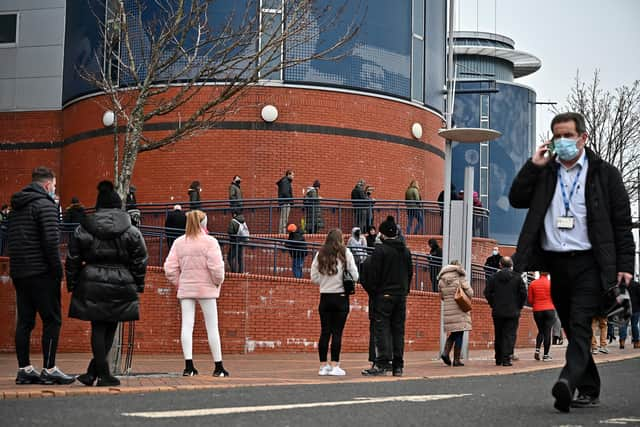Covid Scotland: World Health Organisation not in favour of large-scale lockdowns
Dr Margaret Harris, a public health doctor from the WHO, told Sky News the most important thing people could do is get vaccinated in the fight against the new Omicron variant.
It comes after WHO director-general Dr Tedros Adhanom Ghebreyesus said people may wish to scale back their Christmas plans.


Advertisement
Hide AdAdvertisement
Hide AdHe said: “All of us are sick of this pandemic, all of us want to spend time with friends and family, all of us want to get back to normal.
“The fastest way to do this is for all of us, leaders and individuals, to make the difficult decisions that must be made to protect ourselves and others.
“In some cases, that will mean cancelling or delaying events, just as we have had to cancel the reception we planned to have with you [journalists] today.
“But an event cancelled is better than a life cancelled. It’s better to cancel now and celebrate later than to celebrate now and grieve later.”
Asked whether WHO wants people to cancel Christmas, Dr Harris said that is “not what the director-general was saying – he was saying large events, so he was actually referring to a reception we promised to have with journalists…”
On people’s plans for Christmas, she said the public should think about questions such as “who is coming? What is their status? Have they all been vaccinated? Are you taking other measures – are you opening your windows, ventilating your room? Can you space things, have they worn masks? So there are lots of things that you need to do and take into account when you put your party together.”
Dr Harris said “vaccines are really protecting” people, including the vulnerable, from going into hospital and from dying.
Asked if lots of people can contract Omicron, but not find themselves in hospital, she said: “We’re hoping that that’s the case, especially in well-vaccinated populations. So that’s why we’re saying getting vaccinated is key.”
Advertisement
Hide AdAdvertisement
Hide AdOn the issue of lockdowns, Dr Harris said they work, but not without an impact on people and business.
“We prefer not to see lockdowns, a big lockdown, because they have huge economic implications, they have very severe social implications and mental health implications,” she said.
“However, they do work. So governments do get to a point when the hospitals are overwhelmed, where they run out of options.”
Asked if the UK Government is probably right not to bring in further restrictions, Dr Harris said: “We don’t give marks to any individual country.
“We understand that leadership and health authorities tailor their measures and their decisions according to the epidemiology in their populations, but also the cultural and behavioural dynamics at work in their populations.
“But the overall message is limit crowding and take the measures if you’re out and about that will protect you, like wearing the mask and wearing the mask properly.
"Please wear it over your nose … and make sure that you do the hand-washing, the distancing, and really, really seriously, get vaccinated.
“Not just get vaccinated, but if you know someone who’s still struggling with the idea of being vaccinated, help them to get vaccinated.”
Advertisement
Hide AdAdvertisement
Hide AdRegarding the mental health impact on younger people and the impact of lockdowns, Dr Harris said: “We prefer that governments do not get to the point – that your epidemiology does not get to the point – where governments feel they need to make that decision because, indeed, the mental health impacts are very serious and we have seen a big rise in in mental health suffering during this period.
“So, if you do go into lockdown, look at how you can support people, what you can do to alleviate the suffering that it does cause.”
Dr Tedros said the pandemic could be ended in 2022 if 70 per cent of the population of every country of the world has been vaccinated by the middle of next year.
Comments
Want to join the conversation? Please or to comment on this article.
